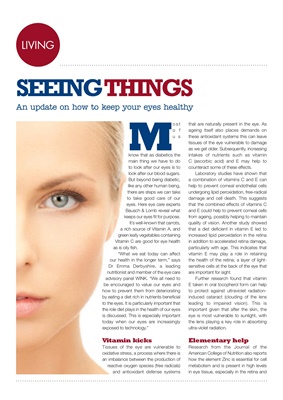
LIVINGLIVING
An update on how to keep your eyes healthy
SEEING THINGS
M
ost
o f
u s
know that as diabetics the
main thing we have to do
to look after our eyes is to
look after our blood sugars.
But beyond being diabetic,
like any other human being,
there are steps we can take
to take good care of our
eyes. Here eye care experts
Bausch & Lomb reveal what
keeps our eyes fit for purpose.
It's well-known that carrots,
a rich source of Vitamin A, and
green leafy vegetables containing
Vitamin C are good for eye health
as is oily fish.
"What we eat today can affect
our health in the longer term," says
Dr Emma Derbyshire, a leading
nutritionist and member of the eye care
advisory panel WINK. "We all need to
be encouraged to value our eyes and
how to prevent them from deteriorating
by eating a diet rich in nutrients beneficial
to the eyes. It is particularly important that
the role diet plays in the health of our eyes
is discussed. This is especially important
today when our eyes are increasingly
exposed to technology."
Vitamin kicks
Tissues of the eye are vulnerable to
oxidative stress, a process where there is
an imbalance between the production of
reactive oxygen species (free radicals)
and antioxidant defense systems
that are naturally present in the eye. As
ageing itself also places demands on
these antioxidant systems this can leave
tissues of the eye vulnerable to damage
as we get older. Subsequently, increasing
intakes of nutrients such as vitamin
C (ascorbic acid) and E may help to
counteract some of these effects.
Laboratory studies have shown that
a combination of vitamins C and E can
help to prevent corneal endothelial cells
undergoing lipid peroxidation, free-radical
damage and cell death. This suggests
that the combined effects of vitamins C
and E could help to prevent corneal cells
from ageing, possibly helping to maintain
quality of vision. Another study showed
that a diet deficient in vitamin E led to
increased lipid peroxidation in the retina
in addition to accelerated retina damage,
particularly with age. This indicates that
vitamin E may play a role in retaining
the health of the retina; a layer of lightsensitive cells at the back of the eye that
are important for sight.
Further research found that vitamin
E taken in oral tocopherol form can help
to protect against ultraviolet radiationinduced cataract (clouding of the lens
leading to impaired vision). This is
important given that after the skin, the
eye is most vulnerable to sunlight, with
the lens playing a key role in absorbing
ultra-violet radiation.
Elementary help
Research from the Journal of the
American College of Nutrition also reports
how the element Zinc is essential for cell
metabolism and is present in high levels
in eye tissue, especially in the retina and